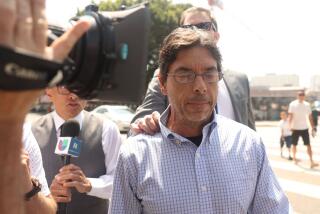Plea Deal Halts Trial in Detox Clinic Death
- Share via
VAN NUYS — Moments before trial was to begin, two members of a cooperative clinic where a man died after being force-fed alcohol in an aversion therapy program pleaded no contest Tuesday to manslaughter.
The last-minute pleas were part of a deal with prosecutors that kept the defendants from prison, and allowed one of them, Jose Rodriguez, to walk out of court essentially a free man.
Authorities initially said Rodriguez was the man in charge of the filthy “mattress room” where patients were kept for days, in some cases against their will. But on the eve of trial, Deputy Dist. Atty. Craig Renetzky said Rodriguez’s involvement with the May death of Enrique Bravo appeared to be minimal.
“He was not actively involved in tying people up or pouring alcohol down their throats,” Renetzky said.
Rodriguez’s defense attorney, Curtis Leftwich, said his client was only involved in the Alcoholics Anonymous meetings held at the unlicensed North Hollywood clinic, not the detox clinic. His only connection to the patients was that he would occasionally give them pep talks.
Leftwich said he was confident his client would have been acquitted, but ‘the offer is just too good to take the risk.” When he is sentenced next month, Rodriguez will receive eight days in county jail for the time he served before his family bailed him out, plus three years’ probation.
Dante Barrera, who also pleaded no contest to involuntary manslaughter charges on Tuesday, faces a maximum of a year in the county jail plus three years probation--the same deal two other co-defendants received in September. Those men, Alberto Saguache and Armando Saquil, have already been released from jail after serving eight months, Renetzky said.
In contrast to Rodriguez, Barrera, Saguache and Saquil have admitted force-feeding Bravo alcohol and tying him up at the now-defunct Grupo Liberacion y Fortaleza at 8605 Lankershim Blvd. When Bravo died, they placed his body on a chair next to a pay telephone on the sidewalk, then called paramedics and denied knowing Bravo.
Authorities said other patients who witnessed the defendants’ actions were bound and gagged and moved to another building when police came to investigate.
“For what they did, it’s not enough time,” said Pedro Ramirez, a friend of the victim. He said his only comfort was knowing that the center was exposed and that his friend’s death may have saved others from the same fate.
The prosecutor said the sentence was a fair one, considering the maximum sentence for involuntary manslaughter is four years in prison. “It’s not murder,” Renetzky said. “If they had intended to kill the guy, they’d be looking at a life sentence, but there’s not a lot of time available to impose for this kind of crime.”
Bravo’s death and that of another man at another unlicensed detox center near downtown Los Angeles led authorities to crack down on unlicensed clinics in June after the number of suspicious deaths linked to the facilities rose to 11 and allegations surfaced of beatings and whippings at some detox centers.
Health department officials said eight clinics suspected of running 24-hour live-in facilities where patients may have been held against their will closed in the ensuing months, half of them after receiving cease-and-desist orders.
In August, three men accused of killing a patient at an unlicensed alcohol treatment center near downtown Los Angeles pleaded no contest to involuntary manslaughter charges and were each sentenced to two years in prison.
In that case, Ariel Prado died of “positional asphyxia” at the Grupo Vida Nueva Alcoholicos Anonimos on Maple Avenue after the defendants force-fed him alcohol, hog-tied and gagged him and left him face down.
*
The defendants in the North Hollywood case all were recovering alcoholics who had themselves been through the program and wanted to help others quit drinking.
Rodriguez had been sober for eight years after going through detox at a similar clinic on Broadway. The other three had also been treated at the North Hollywood clinic.
According to defense lawyers, the entire facility was run as a cooperative, where the hat was passed among those who attended meetings, The relatives of those who were sent there to dry out would sometimes donate as well.
Barrera was referred to the clinic by his brother and dried out in a quick nine days.
For the next three weeks, he ran the back-room clinic with Saguache and Saquil, who had been there longer.
“He decided that he wanted to help people detox because it helped him,” said Barrera’s defense attorney, Frank Di Sabatino. “It was from the heart, really.”
More to Read
Sign up for Essential California
The most important California stories and recommendations in your inbox every morning.
You may occasionally receive promotional content from the Los Angeles Times.












